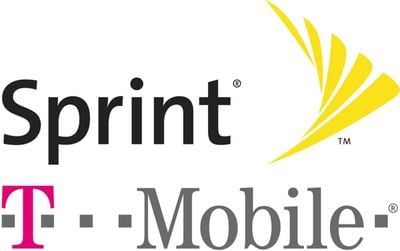The United States Committee on Foreign Investment, aka Cfius, has approved T-Mobile's planned takeover of Sprint, reports The Wall Street Journal.
The government agency reportedly told the two companies on Monday that their planned union was approved following months of negotiations with company representatives.

The U.S. Committee on Foreign Investment reviews foreign deals for potential national security issues. Sprint is mainly owned by Japanese telecom group SoftBank, while German company Deutsche Telekom AG is a majority shareholder of T-Mobile's U.S. arm.
Under the terms of the merger, neither SoftBank nor Deutsche Telekom will be required to make significant changes to their operations.
Sprint and T-Mobile first reached a merger agreement in April 2018, which, if approved, will combine two of the four major carriers in the United States.
The new combined company, which will have nearly 100 million customers, will be named T-Mobile and current T-Mobile CEO John Legere will serve as the Chief Executive Officer.
Before the merger can move forward, it needs to be approved by the Federal Communications Commission and the Justice Department. T-Mobile executives believe the approval process will be finished by the second half of 2019.



















Top Rated Comments
This lasted largely through the 1990s until 1994-ish when President Clinton signed the Telecommunications Act into law. The local RBOCs wanted to offer inter-LATA long distance service, but that was AT&T territory. AT&T wanted to get back into wireline service. By this time, Motorola had also begun standing up cellular towers and brought in the first generation mobile wireless service. It was a wave of new innovation, including DSL and the fragments that became DOCSIS for coax cable service, which was strictly a domain of your local cable provider, which was regionalized and heavily regulated. Everybody wanted a piece of wireless, cable, DSL, long distance, and local wireline.
The law stipulated: Ok, AT&T you can have wireline service again if you give up exclusivity to your long distance. RBOCs, you can have long distance service if you give up your intra-LATA long distance exclusivity to a long distance provider. Sprint/MCI, you can have LATA service if you share your long distance. Effectively: everyone compete with everyone and you can all have a piece of the pie. Mobile cellular wireless was excluded, since it was an bundled thing (handsets + wireless + the wired backhaul at the time).
So the "ideal world" existed. What happened? The Telcom Act happened. And the wireline service nearly died overnight, wireless clearly became the way of the future. Then the RBOCs were allowed to re-unite. NyNEX (in New York) merged with BBN and became GTE. GTE bought Bell Atlantic and became Verizon. Southern Bell renamed to BellSouth, and merged with southern-region RBOCs. BellSouth had a strong wireless service of their own that eventually became Cingular Wireless (and partnered with someone else; i forget). SouthWestern Bell merged with Pacific Bell (IIRC) and became SBC. There was a mid-western Bell that merged with another one and became AmeriTech (based in Chicago). Another west-region Bell merged with another and became Qwest. SBC later bought Ameritech and became SBC AmeriTech. Verizon partnered with a foreign company (i forget the name) and offered Verizon Wireless. Verizon Wireless bought Alltel in the southern US (which came out of a few local wireless mergers, i think including US Cellular). SBC AmeriTech eventually merged with/bought Cingular Wireless. Verizon finally bought its own Verizon Wireless back into just Verizon.
Sprint offered Internet service and partnered with Earthlink for wireline dial-up, DSL, and DOCSIS cable service. There were two popular other Internet providers for dial-up, DSL, and cable (Earthlink and MindSpring) but they eventually merged. AOL was super-popular during this time and partnered with Earthlink in some areas, and partnered with the new-but-growing AT&T Cable in other regions. Eventually, Sprint started dying so they broke themselves up big time. They sold the mobile cellular wireless to Nextel, sold the wireline services including DSL to CenturyTel, and kept the commercial Internet and backbone service; CenturyTel bought a few other locally-divested wireline services and became CenturyLink. Nextel eventually quasi-died and renamed itself Sprint Wireless, which is what T-Mobile is buying. I forget what happened to Sprint's Internet backbone service; probably sold off to Worldcom.
What happened to MCI? MCI bought WorldCom, and got caught in accounting fraud and went bankrupt. Verizon bought the remains of MCI WorldCom. AT&T ran into troubles and quietly went bankrupt and died. Yep, AT&T died. SBC AmeriTech quickly bought the remains of AT&T mobile wireless service, divested the wireline phone, long distance, DSL, and cable service off to various places (everybody got a piece of this I think), then bought Cingular Wireless all in one single deal. SBC AmeriTech swapped company names and logos, and renamed itself the new AT&T. And the new CEO dude walked out on stage at Macworld in 2007 with Steve Jobs to unveil the first iPhone and announce the new AT&T Wireless service and partnership with Apple.
Meanwhile, the ashes of local wireline dial-up and DSL were given to new companies like Frontier and CenturyLink. CenturyLink made their business lean and efficient and continued to gobble up the remaining terrestrial services. The media-merger of AOL Time-Warner was a disaster and later AOL was spun back out and now I think it has died and been given away. Time-Warner Telecom was sold to Level3 Telecom. CenturyLink just bought Level3 for terrestrial wired Internet service (residential, commercial, and backbone). Sprint's internet backbone was sold off to somewhere, probably ended up in CenturyLink. CenturyLink also bought up Qwest in the mid-west.
On the cable side, eventually Charter bought Time-Warner Cable and became Specturm. I think Comcast bought the cable service of SBC AmeriTech/AT&T cable service during the big AT&T death deal. Oh, and I used to work for the company that became Windstream datacenter services. Windstream was a local provider that gobbled up a lot of wireline stuff then they bought into the datacenter Internet/hosted business, and screwed up much of that. So they split the hosted/datacenter stuff back out and became TierPoint. Windstream itself continued on to buy up cable, wireline, and local services, much like Frontier. The FCC established a local telecom fund (the USF - universal service fund) to pay for super-rural wireline services, which pays for the likes of Frontier, Windstream, and other tiny local-only services. It's all huge and incestuous at this point. :)
So the ideal world existed. Now it's largely "AT&T wireless, Verizon Wireless, Sprint Wireless, T-Mobile, CenturyLink, Comcast, Spectrum", and wireline is mostly Frontier, Windstream, and maybe some USF-funded smaller players. Everything else is pretty much just MNVO or partnership/sub-divide of those. There are some smaller others, but they won't last much longer, either. Eventually, sadly, it will all become AT&T and Verizon for mobile wireless; Sprint/T-Mobile won't last for much longer. Wireline will continue to be wasteland of commercial/residential Internet with CenturyLink (only because they bought Level3), Comcast, Spectrum, Frontier(?) but they will eventually unite in some fashion.
I see Frontier and Windstream uniting as Windstream, buying up other wireline remains, then you'll see a three-way battle with Comcast, Spectrum, and the bigger Windstream. Those three will duke it out and become two companies; wireline Internet (fiber, DSL, whatever), and the other one just cable/DOCSIS/fiber. You'll have 2 wireless providers, and 2 terrestrial providers. Welcome to the year 2025.
Have a nice day. :)
I'd rather they stay separate just for the sake of "more competition", but if macduke's comment is true about Sprint being "five years away" from sutting down, I guess a merger with T-Mobile is the better deal, simply because it keeps the spectrum licenses away from VeriT&T.
A new Sprint store just opened in my city. Like, just just within the last couple months. Brand new building and everything. They bought a location that was a local fast-food Mexican chain for the site of the new store. This new store is literally across the street from a years-established T-Mobile store, and I don't mean "in the general area". I mean, you can walk from one to the other in 30 seconds. I lost a place I used to frequently go for food late at night because the regional management was too shortsighted to think "woo, maybe we should wait and see how this merger pans out in case we join T-Mobile and already have a location right there."
In an ideal world, regional carriers would be the norm, with regulations in place that they must allow roaming on their networks so everyone shares infrastructure. This could offer more competition and lower prices, but with potentially more complications and inconsistency in technology.
I forgot about where AOL went, thanks for the refresher. That whole ordeal of AOL-becoming-media was weird; it's just a brand at this point and needs to die. :)
I totally agree about 5G. Pervasive wireless is going to de facto annihilate wireline; I just wonder what CenturyLink is going to do with all that copper infrastructure in the ground... I wonder if they become the one national copper/wireline provider instead. :) Which is exactly what Old AT&T was!! hahaha!
Long ago, I had a customer with an important user in the mountains of NC (yeah, "there's always one in the crowd") who had similar service as your friend. I think their last-mile (give or take a few miles) was also bounced off a microwave tower, and they had nasty latency due to the half-duplex nature, and low bit rate at the time (hundreds of kilobits/per second at that time, 15-ish years ago). I thought then, "dude, your important user needs to friggin' move, or accept the consequences of their hermit lifestyle... I can't fix that!". Sheesh.
5G wireless already has a cross-breeding specs built in with 802.11 WiFi (802.11ad, WiGig). Researchers in Switzerland have already demonstrated it with LTE-A (https://files.ifi.uzh.ch/CSG/staff/Rafati/Handoff-IFI-2018.03.pdf (i hope MR allows this URL; if not: https colon slash slash files.ifi.uzh.ch/CSG/staff/Rafati/Handoff-IFI-2018.03.pdf ). So yeah, 5G Cellular and WiFi is going to be super interesting in the future.